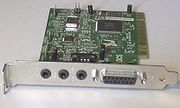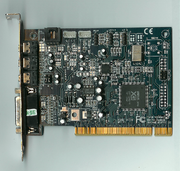
Yamaha YMF7xx
Encyclopedia


Industry Standard Architecture
Industry Standard Architecture is a computer bus standard for IBM PC compatible computers introduced with the IBM Personal Computer to support its Intel 8088 microprocessor's 8-bit external data bus and extended to 16 bits for the IBM Personal Computer/AT's Intel 80286 processor...
bus cards is 719; chips used on PCI
Peripheral Component Interconnect
Conventional PCI is a computer bus for attaching hardware devices in a computer...
cards start at 720 and higher. Chips for PCI bus standalone adapters are marked YMF7x4, while on-board or embedded solutions are marked YMF7x0. The YMF7x4 series features hardware-assisted XG MIDI synthesis with either 32- or 64-note polyphony
Polyphony (instrument)
Polyphony Instruments that are not capable of polyphony are monophonic.-Synthesizer:Most of early synthesizers were monophonic musical instruments which can play only one note at a time, and are often called monosynth as opposed to polysynth...
, full-duplex playback and recording at any samplerate (internally upsampled to 48 kHz), external game controller and MIDI interface, and a legacy block for DOS
DOS
DOS, short for "Disk Operating System", is an acronym for several closely related operating systems that dominated the IBM PC compatible market between 1981 and 1995, or until about 2000 if one includes the partially DOS-based Microsoft Windows versions 95, 98, and Millennium Edition.Related...
application support.
YMF7xx chips were used in many inexpensive (sub-$50) soundcards. Relative performance was good despite the typical low cost. The cards were usually equipped with good quality 18-bit Digital-to-Analogue Converters, providing similar low noise and harmonic distortion levels to those found in semi-professional hardware.
The XG synthesizer on the YMF7x4 series features not only basic XG System Level 1, but also some of the MU-50
Yamaha MU-series
The Yamaha MU-series is a line of sound modules built by Yamaha. All sound modules except MU5 support Yamaha XG. The sound modules were commonly used when computers had slower processors. The computer could send MIDI commands to the sound module, acting as an external sound generation device...
additions, and can reproduce most musical data previously programmed for the popular DB50XG daughterboard. YMF7x4 cards shipped with a 2 MB wavetable bank of 8-bit samples
Sampling (music)
In music, sampling is the act of taking a portion, or sample, of one sound recording and reusing it as an instrument or a different sound recording of a song or piece. Sampling was originally developed by experimental musicians working with musique concrète and electroacoustic music, who physically...
by default, which must be loaded into system RAM
Ram
-Animals:*Ram, an uncastrated male sheep*Ram cichlid, a species of freshwater fish endemic to Colombia and Venezuela-Military:*Battering ram*Ramming, a military tactic in which one vehicle runs into another...
during booting
Booting
In computing, booting is a process that begins when a user turns on a computer system and prepares the computer to perform its normal operations. On modern computers, this typically involves loading and starting an operating system. The boot sequence is the initial set of operations that the...
. Neither the resolution nor content of the wavetable bank are hardware limitations. A user can load their own banks using third-party tools to further improve sound quality or completely change the set of instruments. As with most other XG standard tone generators, YMF7x4 can switch itself into TG300B mode, which is an emulation
Emulator
In computing, an emulator is hardware or software or both that duplicates the functions of a first computer system in a different second computer system, so that the behavior of the second system closely resembles the behavior of the first system...
of the Roland GS
Roland GS
Roland GS, or just GS, sometimes expanded as General Standard or General Sound, is an extension of General MIDI specification. It requires that all GS-compatible equipment must meet a certain set of features and it documents interpretations of some MIDI commands and bytes sequences, thus defining...
standard that allows adequate playback of musical data bearing the GS logo.
Legacy support includes an OPL3 FM synthesizer, Sound Blaster
Sound Blaster
The Sound Blaster family of sound cards was the de facto standard for consumer audio on the IBM PC compatible system platform, until the widespread transition to Microsoft Windows 95, which standardized the programming interface at application level , and the evolution in PC design led to onboard...
Pro (22 kHz 8-bit Stereo) emulation and MPU-401
MPU-401
The MPU-401, where MPU stands for MIDI Processing Unit, was an important but now obsolete interface for connecting MIDI-equipped electronic music hardware to Personal Computers...
compatible MIDI interface. In addition to OPL3, DOS applications running under Windows
Microsoft Windows
Microsoft Windows is a series of operating systems produced by Microsoft.Microsoft introduced an operating environment named Windows on November 20, 1985 as an add-on to MS-DOS in response to the growing interest in graphical user interfaces . Microsoft Windows came to dominate the world's personal...
9x/Me can also use the XG tone generator.
All of these features are available using Yamaha's VxD
VxD
VxD is the device driver model used in Microsoft Windows/386, the 386 enhanced mode of Windows 3.x, Windows 9x, and to some extend also by the Novell DOS 7, OpenDOS 7.01, and DR-DOS 7.02 multitasker...
driver under Windows 9x/Me. WDM
Windows Driver Model
In computing, the Windows Driver Model — also known at one point as the Win32 Driver Model — is a framework for device drivers that was introduced with Windows 98 and Windows 2000 to replace VxD, which was used on older versions of Windows such as Windows 95 and Windows 3.1, as well...
drivers for these operating systems and later Windows 2000/XP provide subjectively unacceptable XG MIDI synthesis (General MIDI
General MIDI
General MIDI or GM is a standardized specification for music synthesizers that respond to MIDI messages. GM was developed by the MIDI Manufacturers Association and the Japan MIDI Standards Committee and first published in 1991...
synthesis is considered acceptable), and may lack important mixer controls, like separate Line-Out and 3D Wide. Legacy mode
Legacy mode
In computing, legacy mode is a state in which a computer system, component, or software application behaves in a way different from its standard operation in order to support older software, data, or expected behavior...
is not supported under NT
Windows NT
Windows NT is a family of operating systems produced by Microsoft, the first version of which was released in July 1993. It was a powerful high-level-language-based, processor-independent, multiprocessing, multiuser operating system with features comparable to Unix. It was intended to complement...
-based OSes.
The original version of the YMF7x4 chipset series is the YMF724. It is limited to two-channel output. It is followed by the YMF744 and its variants, which feature four-channel output. The final and most advanced version of the YMF7x4 chipset series is the YMF754, which also features standard four-channel output, but adds lower power consumption features. The most feature-rich soundcards based on the YMF754 are the Labway XWave 6000 (which has an additional hardware chip to emulate 5.1 surround sound and a six-channel amplifier providing 2W per channel) and the Hoontech SoundTrack i-Phone Digital XG (which features an additional connector for an included speech-optimized headset microphone as well as support circuitry that limits feedback in telephony applications).
External links
- YMF724 specification datasheet (PDF)
- YMF744 specification datasheet (PDF)
- Frequently Asked Questions about YMF7x4 (Russian). Archive copy at the Wayback MachineWayback MachineThe Wayback Machine is a digital time capsule created by the Internet Archive non-profit organization, based in San Francisco, California. It is maintained with content from Alexa Internet. The service enables users to see archived versions of web pages across time, which the Archive calls a "three...
.

